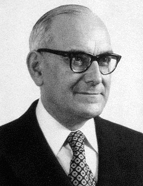

The 1940s were, in many ways, a significant decade for Marcelo Caetano. Rich with historical output, he began to deepen the themes for which he was best known, as well as performing duties within the political apparatus of the regime. His historical output was very prolific until he occupied the office of President of the Council of Ministers. In 1941 he published the first Lições de História do Direito Português (History Lessons of Portuguese Law), which was a first step toward what we would become his final work, published in 1981. It also displays the interdisciplinary approach he proposed for the History of Law. An article entitled "O Município em Portugal" (The Municipality in Portugal, O Século, 1940, p. 97) symbolically marked the beginning of this period. In the article he attempted to highlight the structural importance of the municipality and its communities for the life of the nation. Covering a broad chronological period, he reviews the Roman, medieval and [....] liberal periods, outlining the characteristics, strengths and weaknesses of each era, primarily highlighting the dichotomy between centralisation and decentralisation. He urged, however, that municipalities held an important role in the present day. It was interesting to note Marcelo Caetano's departure from the medievalism of Alexandre Herculano: "Herculano did us a great disservice in persuading us that the modern municipal institutions would be not only more perfect, but also closer to those of the Middle Ages. Each century has its spirit and its demands... " (p. 98).
In the years leading up to his appointment to Chancellor of the University of Lisbon (1959), he was very active in historiography, publishing the works for which he would become definitively known as a historian. His most noteworthy monographs were on the issues of municipalities and the Courts, such as A Antiga Organização dos Mesteres da Cidade de Lisboa (The Ancient Guild Organisation of the City of Lisbon, 1942), A Administração Municipal de Lisboa durante a 1ª Dinastia (The Municipal Administration of Lisbon During the First Dynasty, 1951), O Concelho de Lisboa na Crise de 1383-85 (The Lisbon Council in Crisis from 1383 to 1385, 1951), As Cortes de 1385 (The Courts of 1385, 1951), As Cortes de Leiria de 1254 (The Courts of Leiria of 1254, 1954) – the result of a proposal from the Portuguese Academy of History to gather documentation for the commemoration of the seventh centenary of the first Portuguese courts with popular representation – and his editing of the Regimento dos Oficiais das Cidades, Vilas e Lugares destes Reinos (Official Procedures of the Cities, Towns and Places of these Kingdoms, 1955) which contributed to the overview of medieval municipalities found in his História do Direito Português (History of Portuguese Law, 1981).
